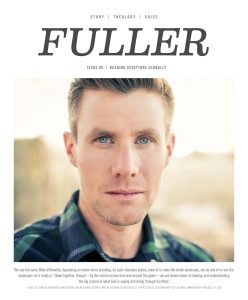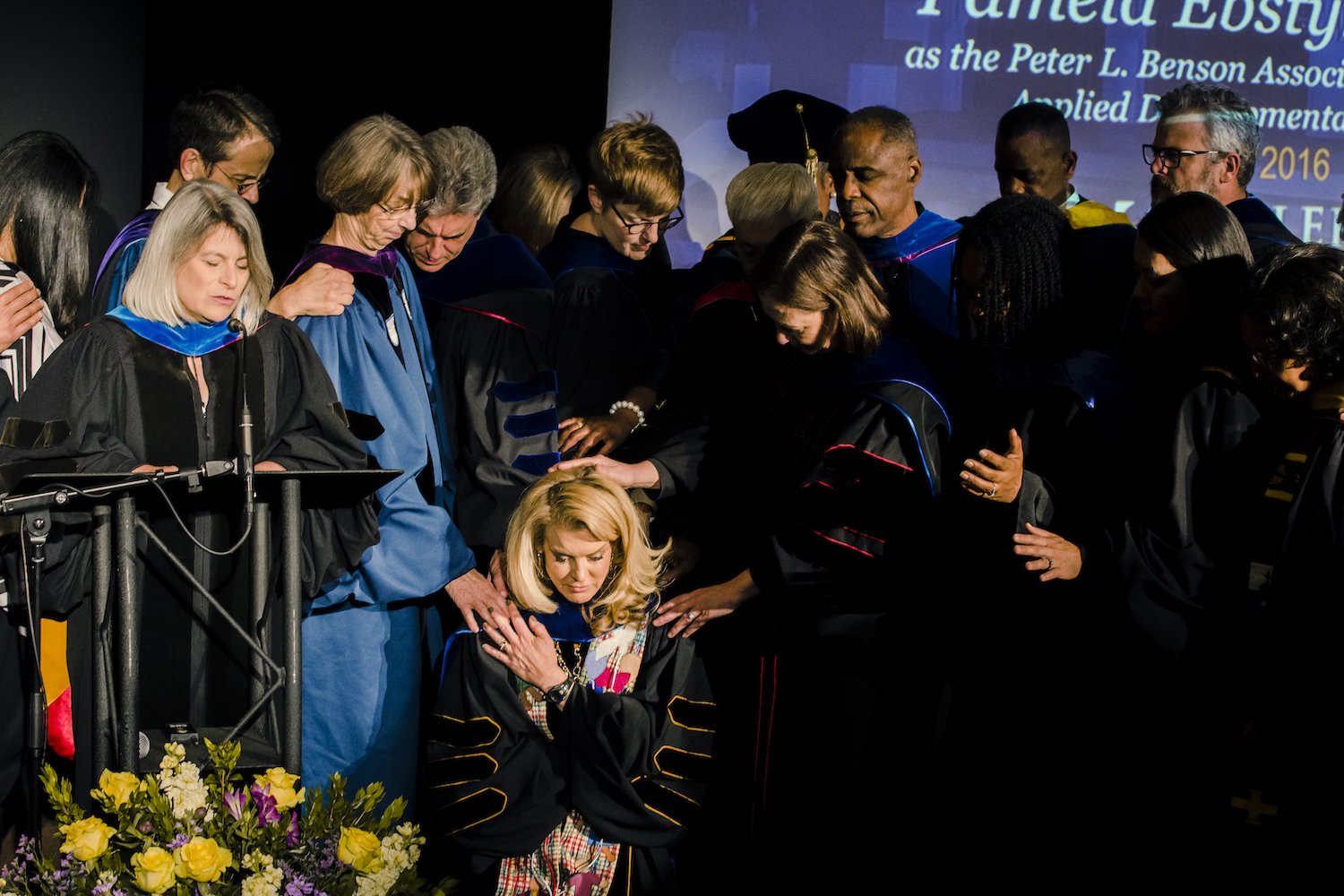
“God’s presence pervades the universe, and that presence is personal. God loves each of us all the time. The problem has to do with us and our ability to quell the noise that goes on constantly in our minds. . . . Prayer is all about getting through the barriers that keep us from God.”
+ Richard V. Peace, professor of evangelism and spiritual formation, in his book Meditative Prayer: Entering God’s Presence. Pictured above: faculty pray for Pamela Ebstyne King as she is installed as the Peter L. Benson Associate Professor of Applied Developmental Science. More than just a ritual of commitment, the laying on of hands is a symbolic gesture toward the nature of theological education—supported by community, guided by prayer.
Learning to Pray
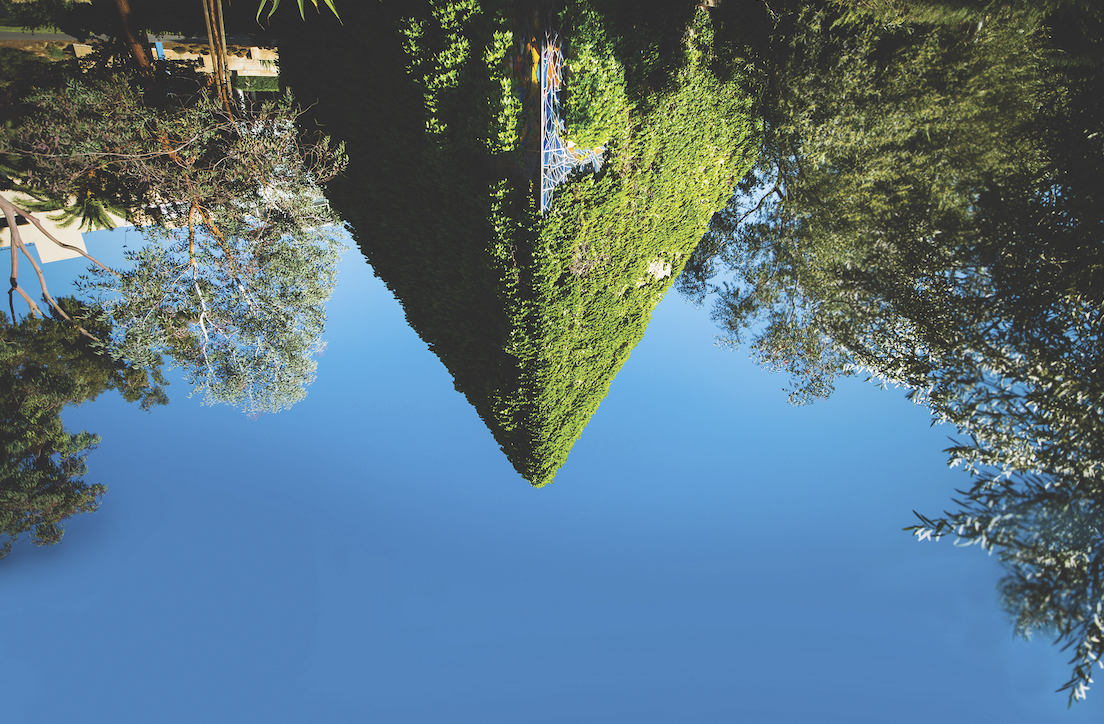
+ Prayer can be paradoxical (evoked here by a unique view, pictured above, of Fuller’s prayer garden), and it involves patience, practice, and connecting to a tradition that is older and deeper than the present moment. The voices gathered below introduce only a few of the many prayer practices we can use to dialogue with the Presence that “pervades the universe.” Click each title to watch more.
THE JESUS PRAYER
“We live in a time when prayer is trapped by the distractions of the world. We are 24/7 in our society: we are always on, always connected, always trying to multitask to do more than one thing, and that makes it very difficult for us to just focus on God, to focus our minds and our hearts on God. We have to look at the wisdom of our own Christian tradition, the wisdom that enables us to develop practices that cause us to be a still point in the frantically turning world we experience.”
+ Charles Scalise, professor of church history, in a discussion about distraction and the Jesus Prayer, an ancient Orthodox form of prayer based on repeating the phrase, “Lord Jesus Christ, Son of God, have mercy on me, a sinner.”
BERAKAH
“Berakah prayer begins objectively with what God has done in history. We know who God is because of what he’s done . . . Christian prayer and worship began with these objective statements, thanking God, and then asking God to intercede on their behalf in the world today.”
+ Todd Johnson, William K. and Delores S. Brehm Associate Professor of Worship, Theology, and the Arts, reflecting on the biblical roots of prayer in the Old Testament. Dr. Johnson is also an associate in the order of Julian of Norwich, a monastic order for contemplative prayer in the Episcopal Church.
TONGSUNG KIDO
Tongsung kido is an opportunity for the worshipping community to offer up to God one prayer that is at once unified and variegated. Coming from cultures that emphasize community more than individuality, this form of prayer stresses the importance of individual prayers participating in the larger picture of God’s work in the community as a whole.”
+ Debi Yu, admissions and student affairs advisor for the Doctor of Ministry program, describing a popular Korean prayer tradition in which many individuals pray aloud at the same time.
THE LORD’S PRAYER
“The Lord’s Prayer is not really a how-to manual or an instructional manual. It’s really a kind of relationship manual and a loyalty manual. It has to do with developing certain patterns of thinking, feeling, and believing that are constituted in certain practices. . . . Those kind of patterns give rise to prayer, but prayer also gives rise to certain renewed and transformed behaviors and thoughts and feelings.”
+ Joel B. Green, provost and dean of the School of Theology, reflecting on the relationships between the Lord’s Prayer and Christian formation.
THE EXAMEN
“The examen is a wonderful tool to use as we’re seeking God’s will and discerning our own vocation, because the parts of my life when I feel alive, present in love, and energized are most likely those places where God has put a gift inside of me or given me a passion or a purpose. When I’m in line with the purposes of God, I am fully alive. The times that I’m detached or removed, I’m somehow farther away from God and God’s plans and purposes for me. As I’ve practiced with the examen on a daily basis, looking for God’s presence in those times of joy and understanding more about God’s movements in places of detachment and pain, it helps me prepare spiritually for those times when I’m really in a difficult place.”
+ Laura Harbert, affiliate professor of clinical psychology, reflecting on the psychological effects of the prayer of examen, an Ignatian practice of prayerfully reviewing our daily lives.
Reflecting on Prayer
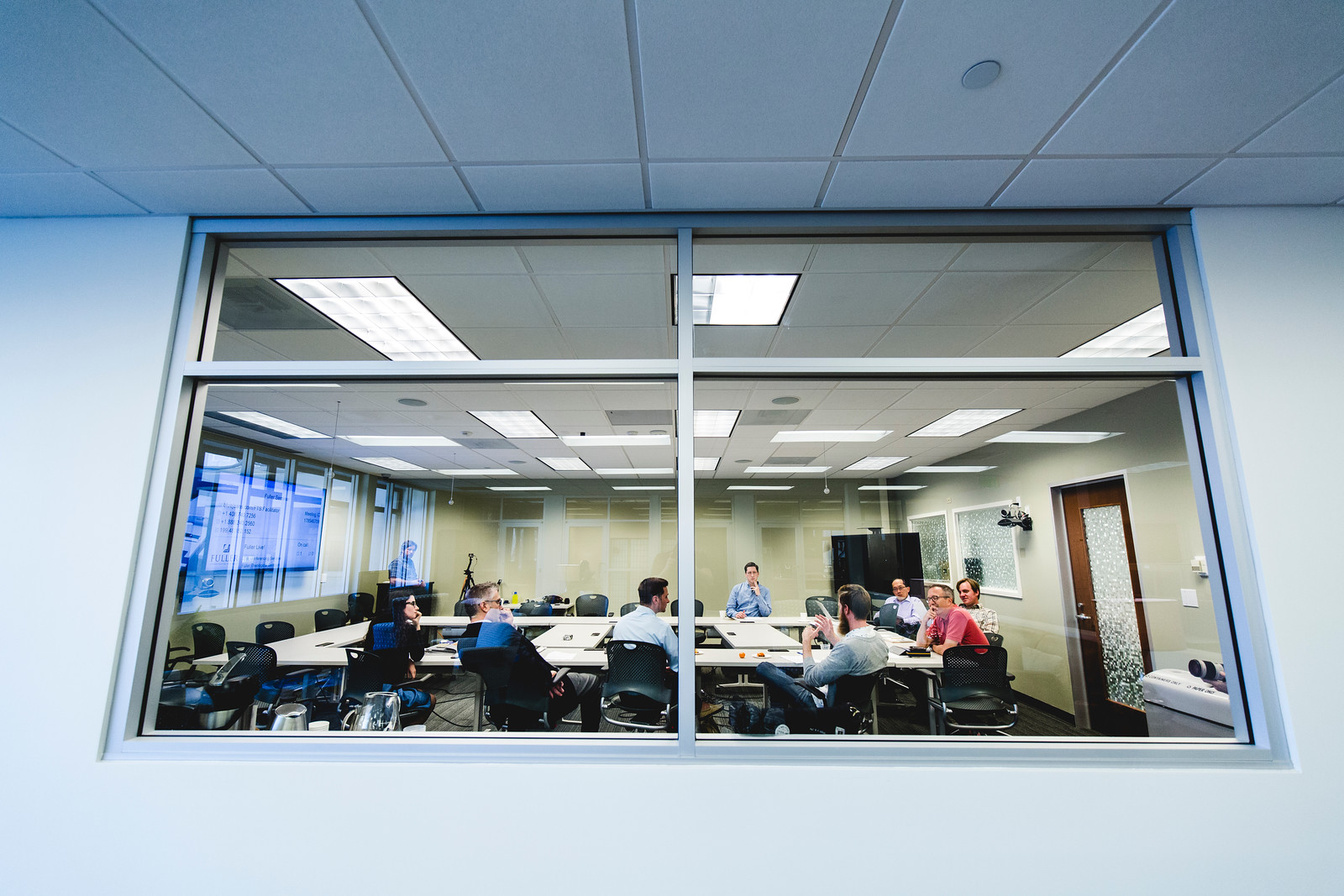
+ The Analytic Theology Initiative is a Templeton-funded research project that integrates theology with analytic philosophy. “Analytic theology presses philosophical tools into theological service,” says Oliver Crisp, professor of systematic theology and director of the project. He hosts a community of students and visiting scholars to work together in using philosophical frameworks to clearly articulate Christian beliefs about prayer, love, and more; listen to the full lectures on the topic of prayer below.
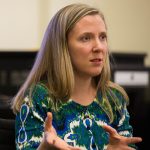 “Analytic theology will not help one pray better if one simply wants to know how to philosophically describe a Christian phenomenon. Indeed, insofar as such desire bends toward curiosity, it works against the ends of prayer. . . . Analytic theology will be spiritually fruitful to the extent that it opens itself up to an end beyond analytic theology.”
“Analytic theology will not help one pray better if one simply wants to know how to philosophically describe a Christian phenomenon. Indeed, insofar as such desire bends toward curiosity, it works against the ends of prayer. . . . Analytic theology will be spiritually fruitful to the extent that it opens itself up to an end beyond analytic theology.”
+ Natalie Carnes, assistant professor of theology at Baylor University
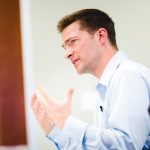 “Communicative prayer seems to be the species of prayer that is in play during liturgies when utterances seem to be addressing God. If God is not the target of an utterance in the liturgy, can these utterances also be seen as addressing God or not?”
“Communicative prayer seems to be the species of prayer that is in play during liturgies when utterances seem to be addressing God. If God is not the target of an utterance in the liturgy, can these utterances also be seen as addressing God or not?”
+ James Arcadi, a fellow of the Analytic Theology project
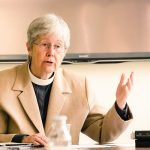 “Prayer has caught up between two folded hands the ache of human life, our longing for purpose, the gnawing fears of everyday life, the inexplicable and cruel . . . . Prayer seems to awaken every longing that goes unquenched in human life, and to lift those desires to the dark luminosity who is God.”
“Prayer has caught up between two folded hands the ache of human life, our longing for purpose, the gnawing fears of everyday life, the inexplicable and cruel . . . . Prayer seems to awaken every longing that goes unquenched in human life, and to lift those desires to the dark luminosity who is God.”
+ Kate Sonderegger, professor of systematic theology at Virginia Theological Seminary
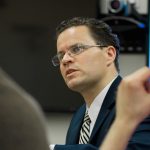 “Prayer can lay the foundation for a theological aesthetic since it transforms not only one’s heart but, in so doing, it transforms one’s way of perceiving the world.”
“Prayer can lay the foundation for a theological aesthetic since it transforms not only one’s heart but, in so doing, it transforms one’s way of perceiving the world.”
+ Kevin Hector, associate professor of theology and philosophy of religion at the University of Chicago
“Lord, Have Mercy!”
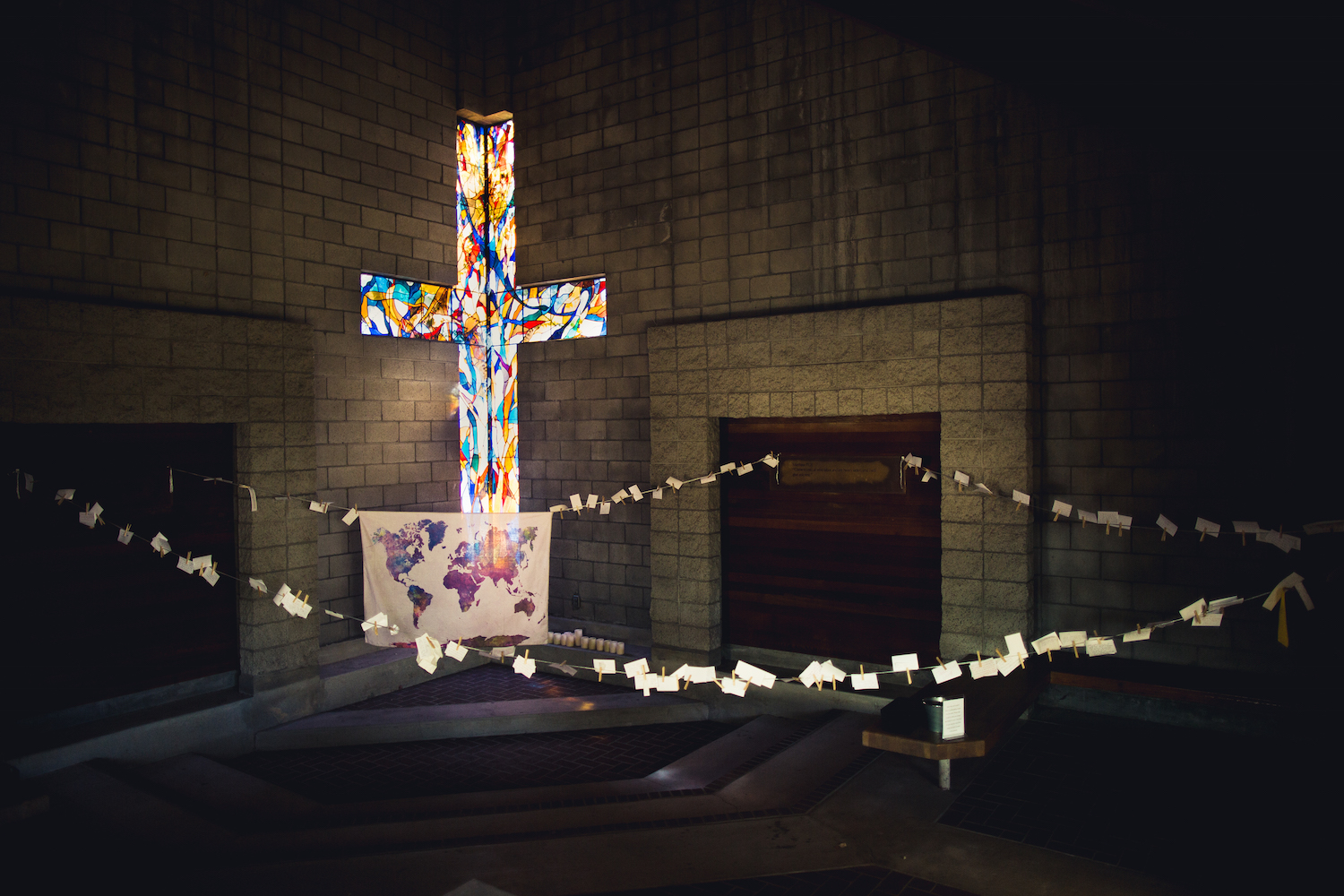
Χριστέ, ἐλέησον
Lord, have mercy!
Cristo, ten piedad
그리스도, 자비를 베푸소서
基督,憐憫
キリスト、慈悲を持っています
ਮਸੀਹ ਹੈ, ਮਿਹਰ ਕਰ
Kristo, nihurumie
Itancan, waonsila ye/yo
+ For centuries, Christians have cried out to God with this simple prayer, words prayed in a single voice no matter the language or culture or time: Lord, have mercy! Many of the languages spoken at Fuller are represented above, and you can hear the prayer set to music in “Kyrie,” a song from Fuller’s worship album REVERE | RESTORE. Julie Tai, director of All Seminary Chapel, wrote the song in response to “the vast amount of suffering, injustice, and pain in our world that we see and that we are responsible for. In these times, the only words I can pray are, ‘Lord, have mercy.’ It is my intimate and fragile prayer.” Earlier this year, the Prayer Garden (pictured) was transformed into a contemplative and creative space for people to pray and reflect on the suffering of the world.
Resources
The Vital Connection: A Fresh Approach to Christian Spirituality and an Opportunity to Move On with God
John Goldingay (St. John’s Extension Studies, 1998)
The Spiritual Formation Series
Richard Peace (NavPress, 1998)
Meditative Prayer: Entering God’s Presence
Richard Peace (Wipf & Stock, 2015)
Available Classes
The Practice of Worship and Prayer with Catherine Barsotti (and other faculty)
Psychology and Spiritual Formation: Integrating Research and Practice with Sarah Schnitker
Spiritual Traditions and Practices with Richard Peace (and other faculty)
The Spiritual Disciplines with Richard Peace
Integration of Spirituality and Urban Ministry with Joseph R. Colletti
Healing Prayer in Intercultural Ministry with J. J. Travis
Spiritual Formation and Integrative Practice Group with Alexis Abernethy
Arts, Spirituality, and Transformation with Alexis Abernethy

